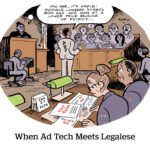Here’s today’s AdExchanger.com news round-up… Want it by email? Sign up here.
Upfront At The Upfront
NBCUniversal’s upfront was quite the affair.
Executives had to enter Radio City Music Hall through a side door because the entrance was blocked by Writers Guild of America protesters. (Guess Netflix was onto something.)
Once everyone was settled, the show kicked off with NBCU execs acknowledging losing their head of global advertising Linda Yaccarino last week, including a few jabs at Twitter.
“Twitter may seem like the place to begin, but Twitter just let all of the crazies back in,” sang Ted, the animated bear from the eponymous movie onstage. (Ouch.)
It’s not an upfront, though, without bragging about ad targeting – and making a nod to measurement.
According to NBCU, its streaming service Peacock can reach 160 million viewers per month, with only 10% duplication.
Right now, “every single impression needs to work harder than ever,” said Mark Marshall, president of ad sales and client partnerships, speaking in Yaccarino’s stead. Quality content also “doesn’t include scrolling,” Marshall said. (No offense, YouTube.)
The TV industry is also laser focused on figuring out measurement.
“We need measurement that can not only count correctly,” Marshall said, “but can also tie ad exposures to sales.” Godspeed.
No Dice For Vice
Vice Media filed for Chapter 11 bankruptcy on Monday.
The one-time giant of digital media, which was valued at about $5.7 billion in 2017, is expected to be sold to a group of its lenders for just $225 million unless a higher bid emerges, The New York Times reports.
The group of lenders, which includes Fortress Investment Group and Soros Fund Management, previously loaned Vice $250 million in 2019. The group also recently secured a $20 million loan to continue operations at Vice until the sale is finalized.
Vice currently has an outstanding debt of $834 million, according to its bankruptcy filing.
Vice’s collapse, like BuzzFeed losing about 94% of its stock value since its IPO, is just more evidence that Big Tech wasn’t healthy for the (now former) darlings of digital media.
These sites relied on social media and YouTube to attract interest from young audiences. While the youngs did indeed flock to Vice and BuzzFeed, et al., they largely consumed their content offsite on social media, meaning the bulk of the ad revenue went to, yep, Big Tech.
Vice’s fate is yet another cautionary tale that a social-native, ad-supported model is no way to build a sustainable publishing business.
Ad-verse Ad-ventures
Popular online gaming platform Roblox is in hot water with the Children’s Advertising Review Unit after failing to clearly label its in-game ads for children younger than 13, the Wall Street Journal reports. The ad industry watchdog also faulted Roblox for using paid social media influencers who didn’t identify their content as promotional.
Close to half (43%) of the free platform’s 66.1 million daily active users in Q1 were under 13, according to Roblox’s latest earnings report. Kids often don’t realize that advertisers are pushing products at them, which is why regulators recommend explicit disclosures.
Roblox insists it’s done nothing wrong but is rolling out a policy on June 15 that blocks brands and game developers from serving ads to kids younger than 13.
This is not the first time that Roblox has come under fire before for not labeling ads properly. Advocacy group Truth in Advertising reported Roblox to the FTC in 2022 for Nikeland, a branded metaverse experience where players could buy virtual goods with Robux. No “Hi, ad here” messages popped up as users set foot in the virtual world.
But Wait, There’s More!
The EU approves Microsoft’s $69 billion acquisition of Activision Blizzard. [Bloomberg]
Reddit is gearing up for a social commerce play this year. [Digiday]
After a shopper makes an online purchase, what happens to the data? [The Drum]
Netflix moves ahead with its cost-cutting plans. [WSJ]
TikTok is helping comedians advance their careers. [Insider]















